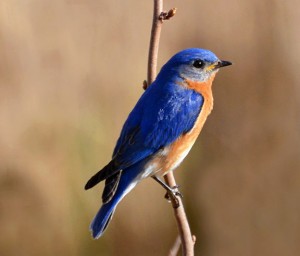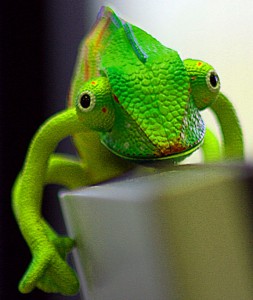Many thanks to Elesia Ashkenazy for kindly giving me a prompt for this story — a bluebird, a construction worker, and a fresh-baked pie.
(Creative Commons image via flickr)
“Can you imagine anybody ever really buying a car as a Christmas present? Those holiday car commercials are totally ridiculous.”
Scowling at the TV, Marcy picked up another slice of pepperoni and sausage pizza from the box on the coffee table. She leaned back into the sagging old couch, trying to find a spot that was at least halfway comfortable. The coffee table wasn’t in much better shape, full of scratches and dings. That luxury car with its gift bows and ribbons looked as much of an alien scene as if it had been beamed from the moon.
“It’s just advertising,” Joe said calmly, sitting to her right. Not much ever bothered Joe; he was a construction worker who took one day at a time. Whenever Marcy got annoyed about something, he would point out that by next year she probably would have forgotten all about it.
And in truth, Marcy knew they had a lot to be thankful for. Now that the recession was over and the economy was looking up, Joe had steady work again, and Marcy finally had gotten a pay raise after going for years without one. Although they had gone through all their savings just to keep the bills paid, at least they’d had enough savings to get through those years without the house being foreclosed. Not all of their friends had been as lucky.
Take it one day at a time, Marcy reminded herself. Still, she was glad the commercial was over. It was never any fun to see things that made her feel poor.
(Creative Commons image via flickr)
After work the next day, Joe went straight from the construction site to a nearby auto dealership and picked out a new midsize sedan to replace Marcy’s ancient clunker. Blue, of course. That was Marcy’s favorite color. Looking at the state Motor Vehicles website on his mobile phone, he found that the personalized license plate BLUBRD was available. And by donating a small extra fee to support the state park system, he could get a license plate that came with a picture of a bluebird in the corner. Just perfect for Marcy’s Christmas present.
He had told her several times already that the clunker needed replacing; it had stranded her at work not long ago, and he’d been out there in the parking lot replacing the starter motor in the dark while she held the flashlight. But Marcy didn’t feel comfortable with buying a new car after so many years of worrying about money. Whenever Joe mentioned it, her answer always was something like, “First we need to build our savings back up, and then we can think about it.”
Although he couldn’t blame Marcy for being cautious about spending, it just wasn’t healthy to go through life always feeling poor and deprived. So, he had made up his mind that this would be the year Marcy got a new car for Christmas, complete with holiday bows and ribbons just like in the commercials. The monthly payments would be manageable, even without putting any money down. He could live with watching TV on the old couch for a while longer.
(Creative Commons image via flickr)
Marcy carried a fresh-baked cherry pie to the new coffee table on Christmas Eve and set the pie down carefully on a towel; it was still hot. She’d taken a vacation day and had the table delivered from the furniture store, as part of a fashionable matched set with a new couch and an end table, while Joe was at work. Although Joe had told her the worn-out old couch didn’t bother him at all, Marcy knew better; she had seen him taking ibuprofen for a sore back on mornings after he fell asleep on the couch watching sports. This would be the perfect Christmas gift for him.
Was that Joe’s pickup truck she heard just now? Marcy wasn’t sure. She had already shut the curtains because it was getting dark. She listened for a moment, but the garage door didn’t go up. Probably not Joe; he’d sent a text message a few minutes ago telling her that instead of coming directly home, he was going to do a bit of gift-wrapping with their friends Carol and Kent. Although Marcy wouldn’t have expected that their well-organized friends would still have wrapping to finish on Christmas Eve, she didn’t think much about it; after all, in the holiday rush, anyone could get behind on things.
So it was as much of a surprise as Joe could have wanted, when he came through the door grinning and told Marcy, “Take a look out the window.”
Pulling back the curtains, Marcy saw her new car in the twilight. It was decorated with shiny bright bows and ribbons in all colors, and even a pair of reindeer antlers made of cardboard and tinsel. Joe’s truck was parked on the street, just in front of Carol and Kent’s big SUV. Evidently they’d helped Joe to get the new car and his truck both home. Standing in the driveway next to the new car, they waved cheerfully when they saw Marcy through the window.
“But, but,” Marcy stammered, gesturing toward the furniture set, “I just spent most of the money in our savings account so you’d be comfortable on the couch! What if…”
Joe took a step toward Marcy and put a finger across her lips.
“No more what-ifs! We’re about to start a new year, and everything is going well. It’s time to feel confident about life again. The new furniture looks great, Marcy, and there’s no need to worry about it. Building those savings back up won’t take long at all.” Wrapping her up in a big hug with his strong arms, he went on to say, “Just a few years ago, we believed many things were possible. Such as, the family we were going to start before the recession hit. I want to get back to making those plans again, Marcy. We can’t keep on living in fear of the future.”
The delicious smell of the cherry pie rose from the coffee table, reminding Marcy of those simpler days when happiness had come so easily to her. Then, all at once, many things did indeed seem possible again; and for the first time in a very long time, thinking of the future made her smile.







